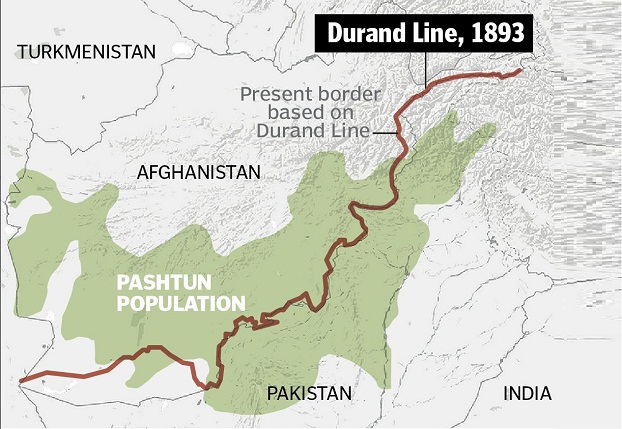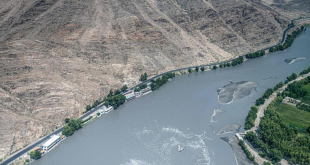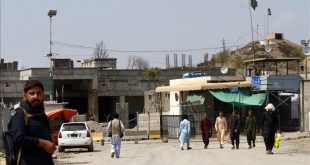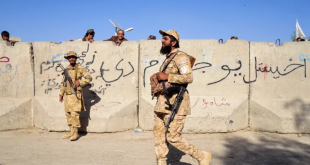“The Pashtuns of Pakistan and the Pashtuns of Afghanistan have not only ethnic kinship, but also historical bond, and to pursue the policy of erecting a wall along the Durand Line wouldn’t be any different than the “Wall of Berlin”, which was created in Germany, says Pakistan’s former ambassador to the United States, Hussain Haqani.
Hussain Haqqani – Former Ambassador of Pakistan to the US: Photo: The Pashtun Times
The Pashtun Times conducted an interview with Pakistan’s former ambassador to the United States abmnd Sri Lanka, and the author of Pakistan: Between Mosque and Military, and Magnificent Delusions: Pakistan, the United States, and an Epic History of Misunderstanding”, Hussain Haqani.
The Pashtun Times: Can you tell us about today’s conference and the objectives of the Saath organisation?
Hussain Haqqani: At a time when when Pakistan is trying to mainstream religious extremist groups, and Pakistan national narrative, which revolves totally around either religious hatred or hatred for Pakistan’s neighbors, therefore, this is important to try to and get together the very weak elements of Pakistani society, represented by Pakistani liberals, progressives, nationalist groups, and Saath, which stands for “South Asia Against Terrorism And For Human Rights”, is an effort towards creating a broad network of people who want Pakistan to give up terrorism, to normalise relations with Afghanistan, and to become a normal country that doesn’t threaten the global order.
So, this is the meeting of intellectuals, academics, social and political activists, who share a common view.
The Pashtun Times: What do you think about the success of this conference? Do you think it will herald the desired results?
Hussain Haqqani: Many Pakistanis who challenged the narrative in Pakistan are eliminated physically. There are many people, who have disappeared. The people who support Baloch and Sindhi nationalism are also missing. So, we don’t want the people face such kind of persecution. We have more than a hundred participants who came from all over the world, including Pakistanis. And I think, we have laid the foundation of a group that will try to challenge the very narrow minded narrative of Pakistan, which legimitizes individuals and groups like the Afghan Taliban, the Haqqani Network, and Lashkar-e-Tayyeba’s Hafiz Saeed is accepted as a Pakistani patriot, but people who advocate 21st Century vision for the country are not.
We want to change that and I think we have laid the foundation of a group which challenge this all.
The Pashtun Times: India was divided, but before that the Pashtuns were divided. And now this division is given permanence by erecting a fence along the Durand Line. You have touched upon the Durand Line issue a bit earlier in the conference, what is your take on this matter?
Hussain Haqqani: Pakistan will be much better off by having normal relations with India and Afghanistan. The Pashtuns of Pakistan and the Pashtuns of Afghanistan have not only ethnic kinship, but a historical relationship as well. Therefore, to build a wall along the Durand Line would be no different than the “Wall of Berlin” that was created in Germany.
I think instead of resorting to such extreme measures, Pakistan should just focus on befriending the people of Afghanistan, to have normal relations with them as a neighbor.
The Pashtun Times: Now that there is a serious rift between civilian political forces and the Pakistani military leaders, what do you think how it will affect Pakistan? The civilian political leadership says that state within state cannot be tolerated anymore?
Hussain Haqqani: Pakistan has a long history of interventions in politics by its military. And I think the time has come for the political leaders to insist that the state affairs should be run according to the constitution. Pakistan like any other country needs a military, but that military should operate within its own legal sphere and they must not be allowed to exceed the limits. This is not the job of the military to define state policies, but its job is to defend the country.
The Pashtun Times: What do you say about the American President Donal Trump’ policy for South Asia?
Hussain Haqqani: President Trump’s policy basically assumes that Pakistan’s behavior will change only when Pakistan is told that America doesn’t accept all excuses and explanations of Pakistan. And that if Pakistan doesn’t behave like an ally it will not be treated like an ally.
I am one of those who feels that this different policy might bring different results. In the past the United States showered Pakistan with aid which made Pakistan more dependent on American aid which didnt make Pakistan a power house like South Korea or Taiwan.
Contrarily it has fueled conflict in the region. I hope that the policy can be different, but we will have to wait and see how its results emerge.
The Pashtun Times: In your book “Pakistan: Between Mosque and Military”, you have criticised only Pakistan’s military but not the United States. Many people are accusing that the US is also not willing to eradicate terrorism in the region. What do you say regarding this?
Hussain Haqqani: In my first book “Pakistan: Between Mosque and Military”, I pointed out the close connection between Pakistan’s military and Pakistan’s jihadist groups. In my second book “Magnificent Delusions: Pakistan, the United States, and an Epic History of Misunderstanding”, I pointed out that American policy has often contributed to Pakistani dysfunction. Both books need to be read together.
I think the United States shouldn’t continue to support Pakistan as a dysfunctional state. Its policy should be aimed at guiding in a direction where Pakistan doesn’t pose any threat to its neighbors or its own people.
The Pashtun Times: Do you think, like many others, while looking into the changing political landscape in our region that geographical changes will take place?
Hussain Haqqani: What we need to do is to find peace with the existing states that are there in South Asia. However, what might happen in the future should only be considered by those who are in the game of predictions. I am someone who focuses on analysing. I don’t go around making predictions.
The Pashtun Times: Thank you for sparing a few moments for this interview with The Pashtun Times.
 Afghanistan Times Latest News and Analysis from Afghanistan and the Region
Afghanistan Times Latest News and Analysis from Afghanistan and the Region




